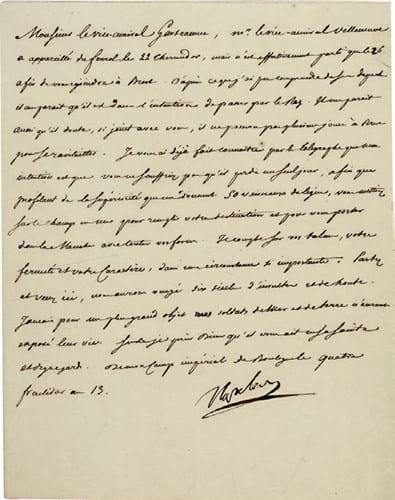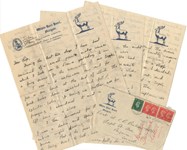
On April 27 Sotheby’s (26/21/14.9% buyer’s premium) offered a second selection from a “remarkable collection of letters and documents, which was assembled by a discerning connoisseur over a period of some 20 years”, comprising “entirely fresh material, covering four centuries of European history, from Philip II of Spain to the end of the Cold War, but once again with a particular focus on the Napoleonic period”.
Several important letters by Napoleon were included, from his crucial command in Italy in 1797 to preparations for the defence of France following the disastrous March on Moscow.
One letter in this collection, estimated at £10,000-15,000 and sold for £60,000 signed ‘Napoleon’, to Vice-Admiral Ganteaume, August 22, 1805, gives orders for the invasion of England.
Napoleon commands him to rendezvous with Admiral Villeneuve at Brest, put to sea immediately and make their way into the English Channel. He praises Ganteaume’s talent, steadfastness and character and urges him to come to Boulogne and avenge ‘six centuries of insult and shame, a cause greater than any other for which his military forces have ever risked their lives’.
England in their grasp
A companion letter to Vice-Admiral Villeneuve on the same day, guided at £8000- 12,000 and sold for £35,000, expresses the hope that he reached the port at Brest, and requests he gather his squadron and join him in the English Channel within the next 24 hours. He closes by declaring that England is within their grasp.
What Napoleon did not know was that, far from the Channel, Villeneuve was trapped at Cadiz by the blockade of Vice Admiral Cuthbert Collingwood. When Napoleon discovered this the following day after sending the letter, he realised that all hope of a successful invasion had evaporated. He turned instead to the German campaign which was to culminate in the great victory of Austerlitz.
Two months after both these letters were sent, the Franco-Spanish fleet under Villeneuve was thrashed at the Battle of Trafalgar. Villeneuve was taken prisoner and on his return to France in April 1806 he committed suicide rather than face Napoleon.














